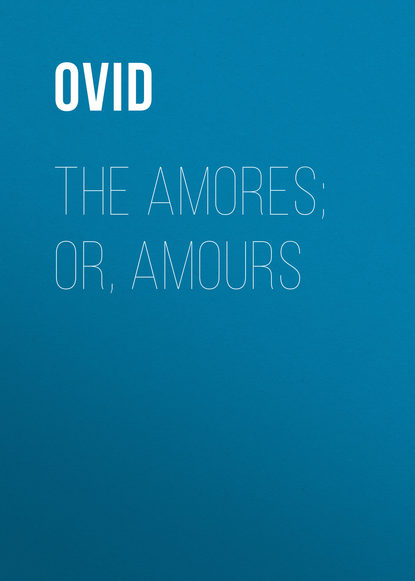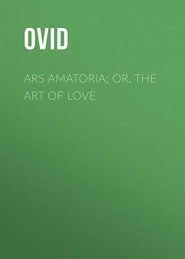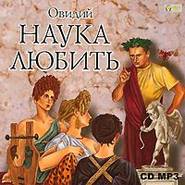По всем вопросам обращайтесь на: info@litportal.ru
(©) 2003-2024.
✖
The Amores; or, Amours
Настройки чтения
Размер шрифта
Высота строк
Поля
524 (return (#x4_x_4_i67))
[ Shrink away in vain.—Ver. 19. She shrinks from him, and seems to think that he is sitting too close, but he tells her that the 'linea' forces them to squeeze. This 'linea' is supposed to have been either cord, or a groove, drawn across the seats at regular intervals, so as to mark out room for a certain number of spectators between each two 'lineæ.']
525 (return (#x4_x_4_i67))
[ Has this advantage.—Ver. 20. He congratulates himsdf on the construction of the place, so aptly giving him an excuse for sitting close to his mistress.]
526 (return (#x4_x_4_i67))
[ But do you —Ver. 21. He is pretending to be very anxious for her comfort, and is begging the person on the other side not to squeeze so close against his mistress.]
527 (return (#x4_x_4_i67))
[ And you as well.—Ver. 23. As in the theatres, the seats, which were called 'gradas,' 'sedilia,' or 'subsellia,' were arranged round the course of the Circus, in ascending tiers; the lowest being, very probably, almost flush with the ground. There were, perhaps, no backs to the seats, or, at the best, only a slight railing of wood. The knees consequently of those in the back row would be level, and in juxta-position with the backs of those in front. He is here telling the person who is sitting behind, to be good enough to keep his knees to himself, and not to hurt the lady's back by pressing against her.]
528 (return (#x4_x_4_i67))
[ I am taking it up.—Ver. 26. He is here showing off his politeness, and will not give her the trouble of gathering up her dress. Even in those days, the ladies seem to have had no objection to their dresses doing the work of the scavenger's broom.]
529 (return (#x4_x_4_i67))
[ The fleet Atalanta.—Ver. 29. Some suppose that the Arcadian Atalanta, the daughter of Iasius, was beloved by a youth of the name of Milanion. According to Apollodorus, who evidently confounds the Arcadian with the Boeotian Atalanta, Milanion was another name of Hippo-menes, who conquered the latter in the foot race, as mentioned in the Tenth Book of the Metamorphoses. See the Translation of the Metamorphoses, p. 375. From this and another passage of Ovid, we have reason to suppose that Atalanta was, by tradition, famous for the beauty of her ancles.]
530 (return (#x4_x_4_i68))
[ The fan may cause.—Ver. 38. Instead of the word 'tabella,' 'flabella' has been suggested here; but as the first syllable is long, such a reading would occasion a violation of the laws of metre, and 'tabella' is probably correct. It has, however, the same meaning here as 'flabella it signifying what we should call 'a fan;' in fact, the 'flabellum' was a 'tabella,' or thin board, edged with peacocks' feathers, or those of other birds, and sometimes with variegated pieces of cloth. These were generally waved by female slaves, who were called 'flabelliferæ'; or else by eunuchs or young boys. They were used to cool the atmosphere, to drive away gnats and flies, and to promote sleep. We here see a gentleman offering to fan a lady, as a compliment; and it must have been especially grateful amid the dust and heat of the Roman Circus. That which was especially intended for the purpose of driving away flies, was called 'muscarium.' The use of fans was not confined to females; as we learn from Suetonius, that the Emperor Augustus had a slave to fan him during his sleep. The fan was also sometimes made of linen, extended upon a light frame, and sometimes of the two wings of a bird, joined back to back, and attached to a handle.]
531 (return (#x4_x_4_i69))
[ Now the procession.—Ver. 34 All this time they have been waiting for the ceremony to commence. The 'Pompa,' or procession, now opens the performance. In this all those who were about to exhibit in the race took a part. The statues of the Gods were borne on wooden platforms on the shoulders of men, or on wheels, according as they were light or heavy. The procession moved from the Capitol, through the Forum, to the Circus Maximus, and was also attended by the officers of state. Musicians and dancers preceded the statues of the Gods. See the Fasti, Book iv. 1. 391, and the Note to the passage.]
532 (return (#x4_x_4_i69))
[ Victory borne.—Ver. 45. On the wooden platform, which was called 'ferculum,' or 'thensa,' according as it was small or large.]
533 (return (#x4_x_4_i69))
[ With expanded wings.—Ver. 45. Victory was always represented with expanded wings, on account of her inconstancy and volatility.]
534 (return (#x4_x_4_i70))
[ Salute Neptune.—Ver. 47. 'Plaudite Neptuno' is equivalent, in our common parlance, to 'Give a cheer for Neptune.' He is addressing the sailors who may be present: but he declines to have anything to do with the sea himself.]
535 (return (#x4_x_4_i70))
[ Arms I detest.—Ver. 49. Like his contemporary, Horace, Ovid was no lover of war.]
536 (return (#x4_x_4_i70))
[ Of the artisan.—Ver. 52. We learn from the Fasti, Book iii. 1.815, that Minerva was especially venerated as the patroness of handicrafts.]
537 (return (#x4_x_4_i70))
[ Let the boxers.—Ver. 54. Boxing was one of the earliest athletic games practised by the Greeks. Apollo and Hercules, as well as Pollux, are celebrated by the poets for excelling in this exercise. It formed a portion of the Olympic contests; while boys fought in the Nemean and Isthmian games. Concerning the 'cæstus' used by pugilists, see the Fasti, Book ii. 1. 367, and the Note to the passage. The method in fighting most practised was to remain on the defensive, and thus to wear out the opponent by continual efforts. To inflict blows, without receiving any in return on the body, was the great point of merit. The right arm was chiefly used for attack, while the office of the left was to protect the body. Teeth were often knocked out, and the ears were much disfigured. The boxers, by the rules of the game, were not allowed to take hold of each other, nor to trip up their antagonist. In Italy boxing seems to have been practised from early times by the people of Etruria. It continued to be one of the popular games during the period of the Republic as well as of the Empire.]
538 (return (#x4_x_4_i70))
[ In the lattice work.—Ver. 64. The 'cancelli' were lattice work, which probably fkirted the outer edge of each wide 'præcinctio,' or passage,that ran along in front of the seats, at certain intervals. As the knees would not there be so cramped, these seats would be considered the most desirable. It is clear that Ovid and the lady have had the good fortune to secure front seats, with the feet resting either on the lowest 'præcinctio', or the 'præcinctio' of a set of seats higher up. Stools, of course, could not be used, as they would be in the way of passers-by. He perceives, as the seat is high, that she has some difficulty in touching the ground with her feet, and naturally concludes that her legs must ache; on which he tells her, if it will give her ease, to rest the tips of her feet on the lattice work railing which was opposite, and which, if they were on an upper 'præcinctio,' ran along the edge of it: or if they were on the very lowest tier, skirted the edge of the 'podium' which formed the basis of that tier. This she might do, if the 'præcinctio' was not more than a yard wide, and if the 'cancelli' were as much as a foot in height.]
539 (return (#x4_x_4_i71))
[ Now the Prcetor.—Ver. 65. The course is now clear of the procession, and the Prætor gives the signal for the start, the 'carceres' being first opened. This was sometimes given by sound of trumpet, or more frequently by letting fall a napkin; at least, after the time of Nero, who is said, on one occasion, while taking a meal, to have heard the shouts of the people who were impatient for the race to begin, on which he threw down his napkin as the signal.]
540 (return (#x4_x_4_i71))
[ The even harriers.—Ver. 66. From this description we should be apt to think that the start was effected at the instant when the 'carceres' were opened. This was not the case: for after coming out of the-carceres,' the chariots were ranged abreast before a white line, which was held by men whose office it was to do, and who were called 'moratores.' When all were ready, and the signal had been given, the white line was thrown down, and the race commenced, which was seven times round the course. The 'career' is called 'æquum,' because they were in a straight line, and each chariot was ranged in front of the door of its 'career.']
541 (return (#x4_x_4_i71))
[ Circuit far too wide.—Ver. 69. The charioteer, whom the lady favours, is going too wide of the 'meta,' or turning-place, and so loses ground, while the next overtakes him.]
542 (return (#x4_x_4_i71))
[ To the left.—Ver. 72. He tells him to guide the horses to the left, so as to keep closer to the 'meta,' and not to lose so much ground by going wide of it.]
543 (return (#x4_x_4_i71))
[ Call him back again.—Ver. 73. He, by accident, lets drop the observation, that they have been interesting themselves for a blockhead. But he immediately checks himself, and, anxious that the favourite may yet distinguish himself, trusts that the spectators will call him back. Crispinus, the Delphin Editor, thinks, that by the calling back, it is meant that it was a false start, and that the race was to be run over again. Bur-mann, however, is not of that opinion; but supposes, that if any chariot did not go well, or the horses seemed jaded, it was the custom to call the driver back from the present race, that with new horses he might join in the next race. This, from the sequel, seems the most rational mode of explanation here.]
544 (return (#x4_x_4_i71))
[ Waving the garments.—Ver. 74. The signal for stopping was given by the men rising and shaking and waving their outer garments, or 'togae,' and probably calling the charioteer by name.]
545 (return (#x4_x_4_i71))
[ Disarrange your hair.—Ver. 75. He is afraid lest her neighbours, in their vehemence should discommode her hair, and tells her, in joke, that she may creep into the bosom of his own 'toga.']
546 (return (#x4_x_4_i72))
[ And now the barrier.—Ver. 77. The first race we are to suppose finished, and the second begins similarly to the first. There were generally twenty-five of these 'missus,' or races in a day.]
547 (return (#x4_x_4_i72))
[ The variegated throng.—Ver. 78. See the Note to the second line.]
548 (return (#x4_x_4_i72))
[ At all events.—Ver. 79. He addresses the favourite, who has again started in this race.]
[ Shrink away in vain.—Ver. 19. She shrinks from him, and seems to think that he is sitting too close, but he tells her that the 'linea' forces them to squeeze. This 'linea' is supposed to have been either cord, or a groove, drawn across the seats at regular intervals, so as to mark out room for a certain number of spectators between each two 'lineæ.']
525 (return (#x4_x_4_i67))
[ Has this advantage.—Ver. 20. He congratulates himsdf on the construction of the place, so aptly giving him an excuse for sitting close to his mistress.]
526 (return (#x4_x_4_i67))
[ But do you —Ver. 21. He is pretending to be very anxious for her comfort, and is begging the person on the other side not to squeeze so close against his mistress.]
527 (return (#x4_x_4_i67))
[ And you as well.—Ver. 23. As in the theatres, the seats, which were called 'gradas,' 'sedilia,' or 'subsellia,' were arranged round the course of the Circus, in ascending tiers; the lowest being, very probably, almost flush with the ground. There were, perhaps, no backs to the seats, or, at the best, only a slight railing of wood. The knees consequently of those in the back row would be level, and in juxta-position with the backs of those in front. He is here telling the person who is sitting behind, to be good enough to keep his knees to himself, and not to hurt the lady's back by pressing against her.]
528 (return (#x4_x_4_i67))
[ I am taking it up.—Ver. 26. He is here showing off his politeness, and will not give her the trouble of gathering up her dress. Even in those days, the ladies seem to have had no objection to their dresses doing the work of the scavenger's broom.]
529 (return (#x4_x_4_i67))
[ The fleet Atalanta.—Ver. 29. Some suppose that the Arcadian Atalanta, the daughter of Iasius, was beloved by a youth of the name of Milanion. According to Apollodorus, who evidently confounds the Arcadian with the Boeotian Atalanta, Milanion was another name of Hippo-menes, who conquered the latter in the foot race, as mentioned in the Tenth Book of the Metamorphoses. See the Translation of the Metamorphoses, p. 375. From this and another passage of Ovid, we have reason to suppose that Atalanta was, by tradition, famous for the beauty of her ancles.]
530 (return (#x4_x_4_i68))
[ The fan may cause.—Ver. 38. Instead of the word 'tabella,' 'flabella' has been suggested here; but as the first syllable is long, such a reading would occasion a violation of the laws of metre, and 'tabella' is probably correct. It has, however, the same meaning here as 'flabella it signifying what we should call 'a fan;' in fact, the 'flabellum' was a 'tabella,' or thin board, edged with peacocks' feathers, or those of other birds, and sometimes with variegated pieces of cloth. These were generally waved by female slaves, who were called 'flabelliferæ'; or else by eunuchs or young boys. They were used to cool the atmosphere, to drive away gnats and flies, and to promote sleep. We here see a gentleman offering to fan a lady, as a compliment; and it must have been especially grateful amid the dust and heat of the Roman Circus. That which was especially intended for the purpose of driving away flies, was called 'muscarium.' The use of fans was not confined to females; as we learn from Suetonius, that the Emperor Augustus had a slave to fan him during his sleep. The fan was also sometimes made of linen, extended upon a light frame, and sometimes of the two wings of a bird, joined back to back, and attached to a handle.]
531 (return (#x4_x_4_i69))
[ Now the procession.—Ver. 34 All this time they have been waiting for the ceremony to commence. The 'Pompa,' or procession, now opens the performance. In this all those who were about to exhibit in the race took a part. The statues of the Gods were borne on wooden platforms on the shoulders of men, or on wheels, according as they were light or heavy. The procession moved from the Capitol, through the Forum, to the Circus Maximus, and was also attended by the officers of state. Musicians and dancers preceded the statues of the Gods. See the Fasti, Book iv. 1. 391, and the Note to the passage.]
532 (return (#x4_x_4_i69))
[ Victory borne.—Ver. 45. On the wooden platform, which was called 'ferculum,' or 'thensa,' according as it was small or large.]
533 (return (#x4_x_4_i69))
[ With expanded wings.—Ver. 45. Victory was always represented with expanded wings, on account of her inconstancy and volatility.]
534 (return (#x4_x_4_i70))
[ Salute Neptune.—Ver. 47. 'Plaudite Neptuno' is equivalent, in our common parlance, to 'Give a cheer for Neptune.' He is addressing the sailors who may be present: but he declines to have anything to do with the sea himself.]
535 (return (#x4_x_4_i70))
[ Arms I detest.—Ver. 49. Like his contemporary, Horace, Ovid was no lover of war.]
536 (return (#x4_x_4_i70))
[ Of the artisan.—Ver. 52. We learn from the Fasti, Book iii. 1.815, that Minerva was especially venerated as the patroness of handicrafts.]
537 (return (#x4_x_4_i70))
[ Let the boxers.—Ver. 54. Boxing was one of the earliest athletic games practised by the Greeks. Apollo and Hercules, as well as Pollux, are celebrated by the poets for excelling in this exercise. It formed a portion of the Olympic contests; while boys fought in the Nemean and Isthmian games. Concerning the 'cæstus' used by pugilists, see the Fasti, Book ii. 1. 367, and the Note to the passage. The method in fighting most practised was to remain on the defensive, and thus to wear out the opponent by continual efforts. To inflict blows, without receiving any in return on the body, was the great point of merit. The right arm was chiefly used for attack, while the office of the left was to protect the body. Teeth were often knocked out, and the ears were much disfigured. The boxers, by the rules of the game, were not allowed to take hold of each other, nor to trip up their antagonist. In Italy boxing seems to have been practised from early times by the people of Etruria. It continued to be one of the popular games during the period of the Republic as well as of the Empire.]
538 (return (#x4_x_4_i70))
[ In the lattice work.—Ver. 64. The 'cancelli' were lattice work, which probably fkirted the outer edge of each wide 'præcinctio,' or passage,that ran along in front of the seats, at certain intervals. As the knees would not there be so cramped, these seats would be considered the most desirable. It is clear that Ovid and the lady have had the good fortune to secure front seats, with the feet resting either on the lowest 'præcinctio', or the 'præcinctio' of a set of seats higher up. Stools, of course, could not be used, as they would be in the way of passers-by. He perceives, as the seat is high, that she has some difficulty in touching the ground with her feet, and naturally concludes that her legs must ache; on which he tells her, if it will give her ease, to rest the tips of her feet on the lattice work railing which was opposite, and which, if they were on an upper 'præcinctio,' ran along the edge of it: or if they were on the very lowest tier, skirted the edge of the 'podium' which formed the basis of that tier. This she might do, if the 'præcinctio' was not more than a yard wide, and if the 'cancelli' were as much as a foot in height.]
539 (return (#x4_x_4_i71))
[ Now the Prcetor.—Ver. 65. The course is now clear of the procession, and the Prætor gives the signal for the start, the 'carceres' being first opened. This was sometimes given by sound of trumpet, or more frequently by letting fall a napkin; at least, after the time of Nero, who is said, on one occasion, while taking a meal, to have heard the shouts of the people who were impatient for the race to begin, on which he threw down his napkin as the signal.]
540 (return (#x4_x_4_i71))
[ The even harriers.—Ver. 66. From this description we should be apt to think that the start was effected at the instant when the 'carceres' were opened. This was not the case: for after coming out of the-carceres,' the chariots were ranged abreast before a white line, which was held by men whose office it was to do, and who were called 'moratores.' When all were ready, and the signal had been given, the white line was thrown down, and the race commenced, which was seven times round the course. The 'career' is called 'æquum,' because they were in a straight line, and each chariot was ranged in front of the door of its 'career.']
541 (return (#x4_x_4_i71))
[ Circuit far too wide.—Ver. 69. The charioteer, whom the lady favours, is going too wide of the 'meta,' or turning-place, and so loses ground, while the next overtakes him.]
542 (return (#x4_x_4_i71))
[ To the left.—Ver. 72. He tells him to guide the horses to the left, so as to keep closer to the 'meta,' and not to lose so much ground by going wide of it.]
543 (return (#x4_x_4_i71))
[ Call him back again.—Ver. 73. He, by accident, lets drop the observation, that they have been interesting themselves for a blockhead. But he immediately checks himself, and, anxious that the favourite may yet distinguish himself, trusts that the spectators will call him back. Crispinus, the Delphin Editor, thinks, that by the calling back, it is meant that it was a false start, and that the race was to be run over again. Bur-mann, however, is not of that opinion; but supposes, that if any chariot did not go well, or the horses seemed jaded, it was the custom to call the driver back from the present race, that with new horses he might join in the next race. This, from the sequel, seems the most rational mode of explanation here.]
544 (return (#x4_x_4_i71))
[ Waving the garments.—Ver. 74. The signal for stopping was given by the men rising and shaking and waving their outer garments, or 'togae,' and probably calling the charioteer by name.]
545 (return (#x4_x_4_i71))
[ Disarrange your hair.—Ver. 75. He is afraid lest her neighbours, in their vehemence should discommode her hair, and tells her, in joke, that she may creep into the bosom of his own 'toga.']
546 (return (#x4_x_4_i72))
[ And now the barrier.—Ver. 77. The first race we are to suppose finished, and the second begins similarly to the first. There were generally twenty-five of these 'missus,' or races in a day.]
547 (return (#x4_x_4_i72))
[ The variegated throng.—Ver. 78. See the Note to the second line.]
548 (return (#x4_x_4_i72))
[ At all events.—Ver. 79. He addresses the favourite, who has again started in this race.]














